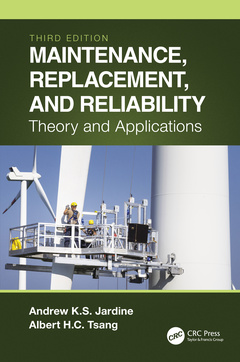Maintenance, Replacement, and Reliability (3rd Ed.) Theory and Applications
Auteurs : Jardine Andrew K. S., Tsang Albert H. C.

Since the publication of the second edition in 2013, there has been an increasing interest in asset management globally, as evidenced by a series of international standards on asset management systems, to achieve excellence in asset management. This cannot be achieved without high-quality data and the tools for data interpretation. The importance of such requirements is widely recognized by industry.
The third edition of this textbook focuses on tools for physical asset management decisions that are data driven. It also uses a theoretical foundation to the tools (mathematical models) that can be used to optimize a variety of key maintenance/replacement/reliability decisions. Problem sets with answers are provided at the end of each chapter. Also available is an extensive set of PowerPoint slides and a solutions manual upon request with qualified textbook adoptions.
This new edition can be used in undergraduate or post-graduate courses on physical asset management.
1. Introduction.
2. Component Replacement Decisions.
3. Inspection Decisions.
4. Capital Equipment Replacement Decisions.
5. Maintenance Resource Requirements.
6. The Role of Emerging Technologies in Physical Asset Management.
Appendix 1: Statistics Primer.
Appendix 2: Weibull Analysis.
Appendix 3: Maximum Likelihood Estimator.
Appendix 4: Markov Chains.
Appendix 5: Knowledge Elicitation.
Appendix 6: Time Value of Money: Discounted Cash Flow Analysis.
Appendix 7: List of Applications of Asset Management Decision Optimization Models.
Appendix 8: Ordinates of the Standard Normal Distribution.
Appendix 9: Areas in the Tail of the Standard Normal Distribution.
Appendix 10: Values of Gamma Function.
Appendix 11: Median Ranks Table.
Appendix 12: Five Percent Ranks Table.
Appendix 13: Ninety-Five Percent Ranks Table.
Appendix 14: Critical Values for the Kolmogorov–Smirnov Statistic (dα).
Appendix 15: Answers to Problems.
Index
Andrew K.S. Jardine is the Founding Director of the Centre for Maintenance Optimization and Reliability Engineering (C-MORE) at the University of Toronto where the focus is on real-world research in engineering asset management in the areas of condition-based maintenance, spares management, protective devices, maintenance and repair contracts, and failure finding intervals for protective devices. Details can be found at www.mie.utoronto.ca/cmore Dr. Jardine is also Professor Emeritus in the Department of Mechanical and Industrial Engineering at the University of Toronto, and Adjunct Professor at Ryerson University, Toronto. Professor Jardine studied at the Royal College of Science and Technology, Scotland and obtained his undergraduate and Master’s degrees in Mechanical Engineering from the University of Strathclyde, Scotland. He was awarded his PhD in Engineering Production by the University of Birmingham, England. Professor Jardine wrote the book, “Maintenance, Replacement and Reliability”, first published in 1973 and now in its 6th printing. He is the co-editor with J.D. Campbell of the 2001 published book “Maintenance Excellence: Optimizing Equipment Life Cycle Decisions”. He co-authored with Dr. A. H. C. Tsang the book “Maintenance, Replacement & Reliability: Theory and Applications”,2nd Edition published by CRC Press, 2013. Professor Jardine co-edited with John D Campbell and J. McGlynn “Asset Management Excellence: Optimizing Life Cycle Decisions” 2nd Edition, published by CRC Press, 2011.
Albert Tsang is former Principal Lecturer of the Department of Industrial & Systems Engineering at The Hong Kong Polytechnic University. Dr. Tsang studied at the University of Hong Kong and graduated with a BSc degree in Mechanical Engineering with first class honours. He later obtained his MSc degree in Industrial Engineering awarded by the same university. He received his MASc and PhD from the University of Toronto
Date de parution : 09-2021
15.6x23.4 cm
Thème de Maintenance, Replacement, and Reliability :
Mots-clés :
Preventive Replacement Policy; Asset Management; Cumulative Distribution Function; Weibull Analysis; Optimal Replacement Interval; Machine Learning; Preventive Replacement Age; Digital Twins; Optimal Replacement Age; Data Analytics; Optimal Preventive Replacement; Industry 4.0; Digital Twin; Pam; RUL Prediction; CBM Optimization; Preventive Replacement; Preventive Replacement Time; Optimal Replacement Policy; Optimal Replacement; Total Downtime; Optimal Inspection Frequency; Large Lathes; Optimal Inspection Interval; Decision Optimization Models; Retained Earnings; Failure Replacement; Optimal Inspection; Wheel Motors; PdM



